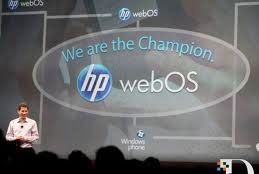
It may be one of the technology world's most expensive efforts to give something away: Hewlett-Packard Co. said Friday that it's making its webOS mobile system available as open-source software that anyone can use and modify freely.
 |
| Illustration image |
It may be one of the technology world's most expensive efforts to give something away: Hewlett-Packard Co. said Friday that it's making its webOS mobile system available as open-source software that anyone can use and modify freely.
HP snagged the intuitive webOS software when it paid $1.8 billion in 2010 for Palm Inc. in what became a failed effort to revive the flailing smartphone pioneer. HP said it still plans to develop and support webOS.
First released on the Palm Pre smartphone in 2009, webOS ultimately ran on several smartphones. In July, HP also used it on its tablet computer, the TouchPad.
The webOS software was marked by its multitasking capabilities and the ability to view open apps as "cards" that you can slide across the screen, tap to enlarge or flick to dismiss. Initially, it was generally well-reviewed by technology critics.
The mobile devices never caught on with consumers, though, many of whom were more enticed by Apple Inc.'s iPhone and iPad and smartphones running Google Inc.'s Android software. Developers also weren't that interested in creating apps for such a small audience.
HP hopes that by offering it to the open-source community, more mobile apps will be developed. The move could also mean that other consumer-electronics manufacturers would decide to make devices that use the software.
Forrester Research analyst Frank Gillett called HP's decision creative. He suspects companies would have been interested in buying webOS from HP, but he's not sure how much they would have wanted to pay for it. This way, HP gets to make a limited investment in webOS' future and keep a hand in mobile software.
"If you decide you can't afford to get in the game fully with both feet, absolutely at least keep your options open," he said.
HP's decision is not unlike what AOL did with the Netscape browser years ago. After losing to Microsoft's Internet Explorer, Netscape was released to the open-source community. Its successor, Firefox, is now one of IE's leading rivals.
Google also has seen success letting developers use its open-source Android software.
The future of webOS had been uncertain since August, when HP said it would stop making tablet computers and smartphones — part of a blundered announcement by then-CEO Leo Apotheker, who also said then that HP was looking into putting its PC business up for sale.
In September, Apotheker was fired and replaced by former eBay CEO Meg Whitman. Whitman said in late October that HP wouldn't be selling off its personal computer business after all, but said then that the future of webOS was still unclear.
Todd Bradley, the head of HP's PC unit, said at the time that it was "fair to say Apple got a great jump-start in the tablet space" and HP was trying to figure out its own best approach. He said HP was focused on building a tablet that uses Microsoft Corp.'s upcoming Windows 8 software.
He added that consumers shouldn't be keeping an eye out for a TouchPad 2, but that the company would "clearly look at what's the right path forward for WebOS." With Friday's announcement, it appears HP believes it has found it.
Shares of HP, which is based in Palo Alto, rose 24 cents to finish trading at $27.90. The stock rose 22 cents to $28.12 in after-hours trading.
(Source: VIR)





